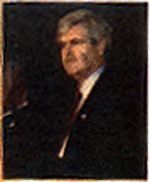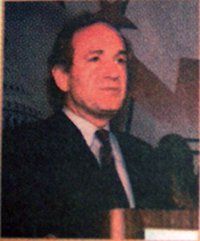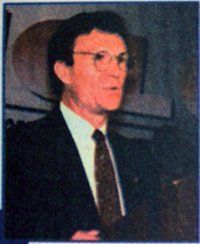It’s a new year and many chiropractors are evaluating what will enhance their respective practices, particularly as it relates to their bottom line. One of the most common questions I get is: “Do I need to be credentialed to bill insurance, and what are the best plans to join?” It’s a loaded question – but one every DC ponders. Whether you're already in-network or pondering whether to join, here's what you need to know.
Gingrich, Dole Top ACA Nat'l Chiropractic Legislative Card
WASHINGTON, D.C. -- The two heavyweights of Congress, Speaker of the House Newt Gingrich (R-GA), and presidential candidate/Senate Majority Leader Bob Dole (R-KS) were joined by other high-profile politicos in presenting their views on health care reform during the American Chiropractic Association's annual National Chiropractic Legislative Conference (NCLC) March 9-10 in the nation's capital. The two powerful Congressional leaders explained that although a Clinton-structured comprehensive health care reform plan is no longer in the works, there is a need for change in the current system if the Republicans hope to balance the budget and fulfill their "Contract with America."
Other prominent legislators in attendance included Senate Democratic Leader Tom Daschle (D-SD); Senators Orrin Hatch (R-UT), Tom Harkin (D-IA), John Chafee (R-RI), Charles Grassley (R-IA), and Fred Thompson (R-TN); Representatives Pete Stark (D-CA), William Jefferson (D-LA), Bill Brewster (D-OK), Bill Thomas (R-CA), Dana Rohrbacher (R-CA), Mel Hancock (R-MS), and Michael Bilirakis (R-FL).

House Speaker Newt Gingrich said Medicare and Medicaid could be improved by increasing access to private health care choices.
Senator Dole, for years a prominent and outspoken Republican, spoke at the ACA-PAC luncheon. He argued that the problems of limited access to health care, high costs, and the large number of uninsured Americans could be alleviated by giving more power to state governments: "If we got a message at all [in the November election] ... it was to give power back to the states ... closer to the people," he said. He urged the chiropractic profession's continued involvement in health care issues. "The system is going to work if you participate in it," he said. "It is not a spectator sport."

Senator Orrin Hatch (R-UT): "Our job together will be to make sure that health care providers, including chiropractors, are treated fairly in the marketplace."
On a similar note, Speaker Gingrich said that Medicare and Medicaid programs could be improved by increasing the access of beneficiaries to private health care choices, freeing them from the "straightjacket" of options currently offered by the Health Care Financing Administration (HCFA). He contended that if given the incentive, consumers would make smarter health care choices. He suggested that consumers could deposit the savings yielded from their health care choices into "medical savings accounts," or programs could be developed to return 10 percent to consumers who detect inaccurately billed medical costs. With these kind of changes, it will "give our children a chance to have a life that isn't crushed by debt," he said. Rep. Gingrich also expressed an interest in allowing the ACA to have input into a GOP Medicare Task Force -- when one is developed. "We need your help, not just as a health care profession, but as citizens," he stated.

Senator Tom Harkin (D-IA), recipient of ACA's 1995 Legislative Leadership Award: "I won't consider the health care battle won until every American can have access to chiropractic care and discrimination against providers is outlawed once and for all."
Senators Hatch and Harkin, long-time chiropractic supporters, reiterated the need for reforms in the health care system, while at the same time proclaiming their support for chiropractic. "I have a tremendous respect for your profession," Sen. Hatch remarked. "Our job together will be to make sure that health care providers, including chiropractors, are treated fairly in the marketplace." Sen. Harkin, the recipient of ACA's 1995 Legislative Leadership Award, vowed "to keep up the fight" to end discrimination against chiropractic in the Medicare program. "I won't consider the health care battle won until every American can have access to chiropractic care and discrimination against providers is outlawed once and for all," he pledged.

Senate Democratic Leader Tom Daschle: "There is no question about the need to include Medicare reimbursement for (chiropractic) x-rays."
Democrats Tom Daschle and Pete Stark expressed their frustration that last year's health care reform legislation did not pass, but agreed that incremental reforms are now the next necessary step. "The goals we enunciated last year are every bit as important now," said Senator Daschle, admitting that "the loss of any meaningful health reform last year was a big disappointment." He promised to work toward changes in Medicare that would benefit chiropractors and their patients. "There is no question about the need to include Medicare reimbursement for (chiropractic) x-rays," Sen. Daschle said, emphasizing that the government "should include reimbursement for every other service [that chiropractors are licensed to perform] that is already covered by Medicare."
Senior member of the Senate Finance Committee John Chafee was cautiously optimistic about ACA's efforts to end Medicare discrimination of chiropractic. He explained that although he believes chiropractic costs are "in lieu of and not in addition to" x-ray services already covered by Medicare, ACA must convince the Congressional Budget Office (CBO) of that fact: "I think your argument is a persuasive one ... Given your efforts over the past year, I trust you will not shrink from this challenge."
Sen. Charles Grassley, another Republican member of the Senate Finance Committee, agreed that ACA's argument for reimbursement of chiropractic under Medicaid is a valid one, however, like Sen. Chafee, he too said that the profession must persuade the CBO of chiropractic's cost-effectiveness. "As reasonable as such a proposal is ... they [CBO] are the determinant ... The chances of that passing are very good if we don't have that [added] cost."
Another chiropractic proponent, Congressman William Jefferson, offered his support for ACA's Medicare legislation, explaining that the "freedom of choice of provider" concept followed by more than 40 states in their fee-for-service plans should apply to the Medicare program. "It's now time for Medicare to catch up with the states on this level," he said. As a member last year of the powerful Ways and Means Committee, Rep. Jefferson sponsored the ACA-initiated "any willing provider" amendment to the health reform bill. Although he said that he was disappointed that the comprehensive health care reform failed in the 103rd Congress, he noted that ACA's actions last year have helped to change the course of the health care debate in the 104th Congress.
Similarly, Rep. Bill Brewster, who guided ACA's "point-of-service" amendment to approval in the Ways and Means Committee mark-up last year, agreed that if chiropractors are licensed to perform a service that is covered by a plan, it should be reimbursed. "Why in the world should the patient not have the opportunity to see the physician of their choice? You're a recognized profession that is very effective in helping on many occasions," he said.
Rep. Bill Thomas told the legislative conference attendees that Congress will begin a "long overdue overhaul" of the Medicare system, and the chiropractic profession must demonstrate through evidence and outcomes that chiropractic care can reduce health care costs. "I happen to know, from practical experience, that you folks offer a service that is more effective than found in some branches of medicine and significantly cheaper. You just have to prove it," he said. He added that he will "make sure opportunities are provided for chiropractic to show its effectiveness."
Senator Strom Thurmond (R-SC), a chiropractic ally for many years, was scheduled to speak at the conference, but was unable to attend. He extended his greetings via a written statement. "As an advocate of preventative medicine and chiropractic care," he wrote, "I have sponsored a number of initiatives designed to promote the profession. We have enjoyed several successes, the most notable being among the armed services. Under my direction, the four branches of the military will soon be conducting a test to evaluate the costs and benefits of treating military personnel with chiropractic care, and I have called upon them to begin commissioning doctors of chiropractic into their profession health services."
Another encouragement for chiropractic came from freshman Senator Fred Thompson (R-TN) who announced during an NCLC congressional reception that he has personally benefitted from chiropractic treatment and is aware of the value of chiropractic care. "My door will always be open to you," he assured.
AHCPR Guidelines Have an Impact
The positive influence of the recommendations for spinal manipulation by the panel convened by the Agency for Health Care Policy and Research for acute low back problems in adults, was evident in comments by Christopher Jennings, special assistant to President Clinton for Health Policy Development: "To the great credit of your profession, we're finally breaking through the problem of people not wanting to believe that chiropractic care can provide beneficial results," he said. Mr. Jennings advised the ACA to continue its dialogue with Health Care Financing Administration Chief Bruce Vladeck, and the managed care industry, to push the results of the AHCPR guidelines. He told conference attendees that, ideally, managed care plans will increasingly include chiropractic based on the guidelines.
"The guidelines acknowledge what we've been saying for years," Sen. Hatch said. He stressed that he is impressed with chiropractic care, saying "what you do is very important and healing."
The AHCPR's acknowledgement that spinal manipulation is effective was long overdue, according to Rep. Dana Rohrbacher, who said that he believes chiropractic care will save the U.S. billions of dollars. "It only took them umpteen years to discover that [chiropractic care is effective] ... when we have millions of Americans who discovered that a long time ago, and are living healthier, happier lives because of it."
Rep. Mel Hancock also pointed to the AHCPR guidelines as validation of chiropractic treatment. "The pendulum is starting to swing" in chiropractic's favor. "The method of treatment that you [chiropractic] employ is noninvasive," he said. "I think that your profession is going to be [increasingly] utilized."
1995 NCLC Indicates New Respect for Chiropractic
ACA President Russell Sawyer Jr., praised this year's NCLC as a landmark event demonstrating new respect for chiropractic within the federal government. "The fact that ACA was able to attract the most influential legislators in Congress to speak at NCLC underscored the fact that the chiropractic profession and the ACA are gaining respect and recognition on Capital Hill," he said. "From powerful GOP leaders like Speaker of the House Newt Gingrich and Senate Majority Leader Bob Dole to Senate Democratic Leader Tom Daschle and long-time chiropractic supporters Senators Tom Harkin and Orrin Hatch, NCLC attendees were able to hear firsthand the outlook for health care reform in the 104th Congress. And, even more importantly, every one of those powerful members of Congress appeared receptive to the concerns of the chiropractic profession."
ACA Arizona delegate Dr. Jerry Gerrard said he was encouraged. "I have been to the Hill many times in past years to lobby for the chiropractic profession, and this year was the first time I was really able to talk issues with my representatives. In the past, a lot of my time was spent giving background and defending chiropractic."



